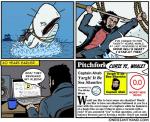
whaling
Whaling is the process of hunting of whales for their usable products such as meat and blubber, which can be turned into a type of oil that became increasingly important in the Industrial Revolution. It was practiced as an organized industry as early as 875 AD. By the 16th century, it had risen to be the principal industry in the coastal regions of Spain and France. The industry spread throughout the world, and became increasingly profitable in terms of trade and resources. Some regions of the world's oceans, along the animals' migration routes, had a particularly dense whale population, and became the targets for large concentrations of whaling ships, and the industry continued to grow well into the 20th century. The depletion of some whale species to near extinction led to the banning of whaling in many countries by 1969, and to a worldwide cessation of whaling as an industry in the late 1980s.
The earliest forms of whaling date to at least c. 3000 BC. Coastal communities around the world have long histories of subsistence use of cetaceans, by dolphin drive hunting and by harvesting drift whales. Industrial whaling emerged with organized fleets of whaleships in the 17th century; competitive national whaling industries in the 18th and 19th centuries; and the introduction of factory ships along with the concept of whale harvesting in the first half of the 20th century. By the late 1930s, more than 50,000 whales were killed annually. In 1986, the International Whaling Commission (IWC) banned commercial whaling because of the extreme depletion of most of the whale stocks.
Contemporary whaling is subject to intense debate. Canada, Iceland, Japan, Norway, Russia, South Korea, the United States and the Danish dependencies of the Faroe Islands and Greenland continue to hunt in the 21st century. Countries that support commercial whaling, notably Iceland, Japan, and Norway, wish to lift the IWC moratorium on certain whale stocks for hunting. Anti-whaling countries and environmental groups oppose lifting the ban. Under the terms of the IWC moratorium, aboriginal whaling is allowed to continue on a subsistence basis. Over the past few decades, whale watching has become a significant industry in many parts of the world; in some countries, it has replaced whaling, but in a few others, the two business models exist in an uneasy tension. The live capture of cetaceans for display in aquaria (e.g., captive killer whales) continues.
